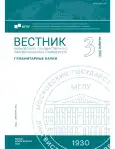The Discovery of the Ethnocultural Specifics of Society (based on the material of the associative fields of Russians, Germans, Austrians)
- Authors: Baranov Y.V.1
-
Affiliations:
- Moscow State Linguistic University
- Issue: No 3(884) (2024)
- Pages: 55-62
- Section: Linguistics
- URL: https://journal-vniispk.ru/2542-2197/article/view/316174
- ID: 316174
Cite item
Abstract
The analysis of associative fields of lexemes nominating values has become an effective way of studying identity in psycholinguistics. Basic values are a hierarchical, fundamentally dynamic, but synchronically stable system, and this makes it possible to consider them as part of an ethnic identity. With the help of associative fields analysis, the actual content of values is established, the dynamics of value orientations is predicted. The author compares the associative fields of social justice and security of Russians, Germans, and Austrians, emphasizing significant differences in their worldviews.
About the authors
Yuri Viktorovich Baranov
Moscow State Linguistic University
Author for correspondence.
Email: formosa2020@mail.ru
Senior Lecturer Department of Linguistics and Intercultural Communication Distance Learning Faculty Moscow State Linguistic University
Russian FederationReferences
- Pishchalnikova, V. A. (2021). Associative experiment and psycholinguistic research of individual identity. Vestnik of Moscow State Linguistic University. Humanities, 2(844), 105–118. (In Russ.)
- Pishchalnikova, V. A. et al. (2020). Dvuyazychnyj associativnyj slovar’ bazovyh cennostej = Bilingual associative dictionary of basic values. Moscow: Sputnik+. (In Russ.)
- Leontyev, A. A. (1997). Osnovy psikholingvistiki = Fundamentals of psycholinguistics. Moscow: Smysl. (In Russ.)
- Khlopova, A. I. (2023). Content of the concept of “Toleranz” in German linguoculture. Vestnik of Moscow State Linguistic University. Humanities, 2(870), 57–65. (In Russ.)
Supplementary files










